Jack Kennedy: Is the Brexit Adjustment Reserve fund a one-off or will it be repeated? Brexit impacts and consequences for Irish agriculture won’t be felt until 2024-25, eg the impact of the UK’s free trade deals (FTA) with Australia/New Zealand may flood EU markets with UK beef and sheepmeat
European Commissioner for Agriculture Janusz Wojciechowski: “This is a specific situation of Irish agriculture because Ireland is highly dependent on exports. No other country globally – only maybe New Zealand – is as dependent.
“The most recent milk production data shows there is 1,813kg of milk produced per capita in Ireland and this is six times more than the average EU consumption.
“The same is true in beef/meat where Ireland is eight times over EU average consumption, so it shows Ireland depends a lot on exports. The value of Irish exports to the UK has increased from €5bn to €6bn last year (2022). There is no plan to repeat BAR funding but will monitor the situation and, if necessary, reengage but not now.”
But, Commissioner, would you agree that the FTA impact is only starting now for Ireland?
“I fully understand the concerns about the FTAs and the interests of Irish farmers are important when I consider, for example, our trade agreement with New Zealand.
“Our position was to protect the farmers and not allow huge volumes of imports and the same way when talking to Australia.
“Remember, we have to also understand that the EU is the largest food exporter in the world. For the last decade, that has been the story and in 2022 there was a surplus €58bn and that a huge contribution of this was from Irish farmers and Ireland is the fourth biggest EU member state in this ranking of EU countries.
“Remember, we need the open trade and this makes it profitable for all and we need to be careful not to limit the imports. I mean not fully open but free trade plays a very important role. It depends on what countries you are dealing with but it is generally profitable to have an open market and we need to be careful of restrictions.
“When I look at numbers, there is some positive phenomena in Irish agriculture. The EU data shows us from the last census when we compare 2010 and 2020 that generally we lost 25% of farms in the EU, and in Ireland the comparable figure was only 7%, so the reduction was not as great.”
Is the Commission looking at supports for EU dairy farmers in light of high input costs and falling EU milk prices?
“We fully recognise the problem of low milk prices and this is not unusual as we sometimes have seasonal low prices.
“We will monitor the situation because it is different across the member states but at the next Council meeting (Tuesday 30 May) I will propose to use the crisis reserve fund to make it available for the member states, so that is €250m for this year subject to the approval of the member states.”
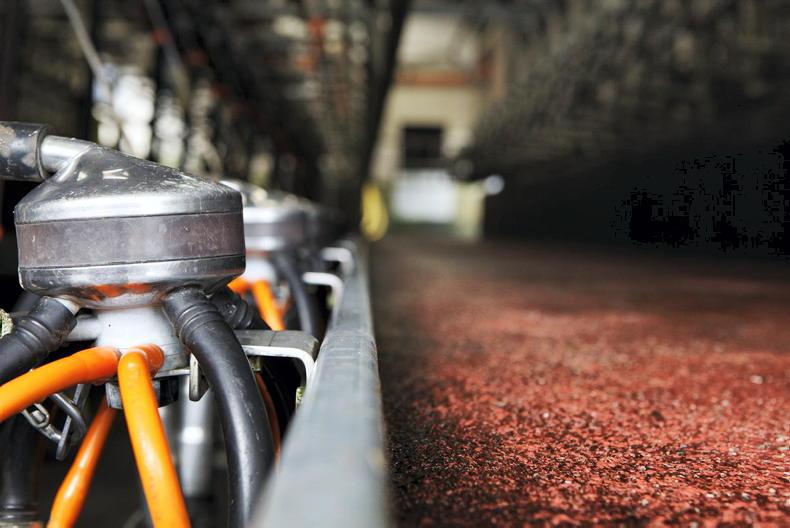
'We fully recognise the problem of low milk prices and this is not unusual as we sometimes have seasonal low prices,' the European Commissioner for Agriculture said.
Has the Commission considered the impact of policy on organic production and reduced use of fertiliser in relation to fodder supplies in countries like Ireland? Has there been enough work on the impact assessment of organics in Ireland to roll out an EU policy?
“There is big space for increasing organic production in Ireland. More specifically, Irish farming is not very intensive and in fact is extensive.
“For example, the productivity of one cow is 6,000 litres compared to 10,000 litres per cow in some other countries.
“Extensive production can be profitable and good for the promotion of food and farming and I will take this into account on my promotional campaign to Japan in the next month and when in discussions one of my arguments is that we have extensive production and high welfare standards and Ireland represents that.”
Some have the fear that organic will change the system away from grass and extensive production as you need lower stocking rates so maybe farmers will push for higher per cow production?
“Yes, of course, organic farming is less intensive and the idea is to compensate with additional payment as a subsidy and higher price should be a compensation also and this is complex."
Ireland has one of the best situations and it is very easy to present Irish farming with high welfare standards and our intention is to promote more sustainable farming
“However, we not only need to increase the number of farms but demand for organic consumption also needs to increase and we have a plan and need to develop this and some issues like public procurement and promotion of organic needs to improve.
“So, yes, organic is one thing but the other thing is we need to promote sustainable production and Ireland has one of the best situations and it is very easy to present Irish farming with high welfare standards and our intention is to promote more sustainable farming.”
Will member states have discretion on implementation of the nature restoration law? How will farmers be compensated and for how long?
“OK, so nature restoration is not directly in my brief. My approach was that the Green Deal in agriculture should be included in CAP reform and used to incentivise farmers.
“I feel we achieved good political compromise in the Green Deal and have a lot of actions for the environment in terms of crop diversification, landscape features, many obligations for protecting environment, eg eco schemes mandatory for member states.
“I fully support this to support investment for more climate-friendly initiatives.
“Yes, I hear farmers’ concerns of pesticides and greenhouse gas emissions restrictions, and I share these concerns, when I present to the Commission.
“Now, everything is in the hands of the member states and the main concern of farmers in different countries is that there are different starting points, eg pesticides starting from farmers using 9kg of pesticide to those only using 0.5kg of pesticide per year.
“Proportional reduction is not fair for member states, and this is now controversial, but now this is not a Commission decision and it is up to the member state and the European Parliament.
“Getting back to the nature restoration, I see the agri and fish committees have voted against it.
“In general, in the EU, we must have potential to reduce distance from farm to fork and many member states have access direct to local market and this is preferable.
“However, now we are almost always in permanent crisis – three years of COVID-19, now the war situation, and we need to reconsider this situation.
We need to be independent and have our own production
“We can’t put too much pressure on farmers with new additional expectations in a crisis situation and introducing CAP reform is enough rather than heaping more pressures on farmers.”
Does this mean more emphasis on food security?
“Yes, that was almost forbidden to talk about in the past. However, during COVID-19, this was the first lesson on how important food security is.
“We need to be independent and have our own production.
“Food security is important and is positive and with the intervention of the Commission we avoided food supply issues. This was a helpful lesson from this crisis.
“Now, with the Ukraine situation food security is a main task and vision for future.
“I see a future of four ‘S’ – security, stability, sustainability and solidarity – animals are not machines and solidarity is the role of European farmers in global security and need to maintain this position and it is a key role of the EU.”
How long will it take to go back on the gene-editing rules and allow their use in Europe?
“We discuss gene editing a lot and we need to respect that science but also respect the agriculture and farming to make it more resilient. Two things on this, and this is my position; firstly, we need to protect the farmers that they are not dependent on patent rights.
“Secondly, the situation of organic farmers and co-existence is important because neighbouring farmers might be using GM technology.”
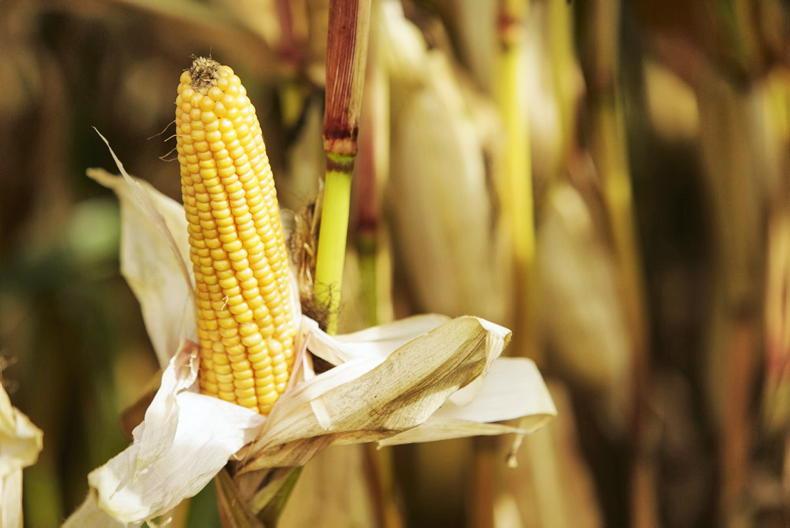
We have the highest production standards in the world and we have WTO rules that we should respect and not create new rules for our exports.
Do you think it is OK to ban gene editing, while we import GM maize and soya beans and import commodities produced using chemicals that are banned here?
“In general, our vision is that it would be better if all the same, but, in practice not always possible but we need to try to achieve as much as possible.
“We have the highest production standards in the world and we have WTO rules that we should respect and not create new rules for our exports.
“We need to be careful, but GMO is not bad in EU, but risk assessment is needed and the role of national legislation is important. In my country, Poland, there is no GMO cultivation but GMO feed is used by farmers.
“I think the general direction is to have the same and we have to promote high standards.”
Shaping the next CAP and changes
You will have significant impact on shaping the next CAP. What are your ambitions and what changes can we expect?
“Almost all farmers in Ireland enter the CAP which I think is great, but I fear some farmers will resign from the CAP and not apply because they think it is too restrictive to apply and I feel we are very close to that situation.
“Some farmers might decide to be free to produce more and have no conditionality and no restrictions."
More sustainable agriculture is what we need and Ireland is a good example because you have good production but also sustainable production
“We need more money in the CAP budget in the next financial year because we create more tasks, more challenges for farmers.
“We also need more instruments for crisis management.
“What was the problem for me was we had CAP policy but not enough common instruments in crisis reserve management.
“Yes, it is better than in the past because we have €450m that is not paid by the farmers. However, it is not enough to solve the problems and we have had to use ‘State aid’ too many times with the most recent example the ongoing war in Ukraine.
“We opened the temporary crisis framework for everyone to include farmers and now that pot is €7.5bn but long-term State aid creates difference between member states so its only a short term measure.”
But come back on the changes expected – will the incentives twist back more to food production than the environment?
“It should be balanced because we need to continue these good proposals that we have going now, good initiatives like the eco schemes.
“If there were two recommendations I would be pushing, it would be carbon farming for cropping farmers and animal welfare as a main instrument for animal farms.
“This is because my observation is that both would be helpful for farmers and helpful for productivity because good agri practices for the long term only come by sustainable agriculture.
It is easy to incentivise and intensify production. However, it’s not what we want. More sustainable agriculture is what we need and Ireland is a good example because you have good production but also sustainable production.”
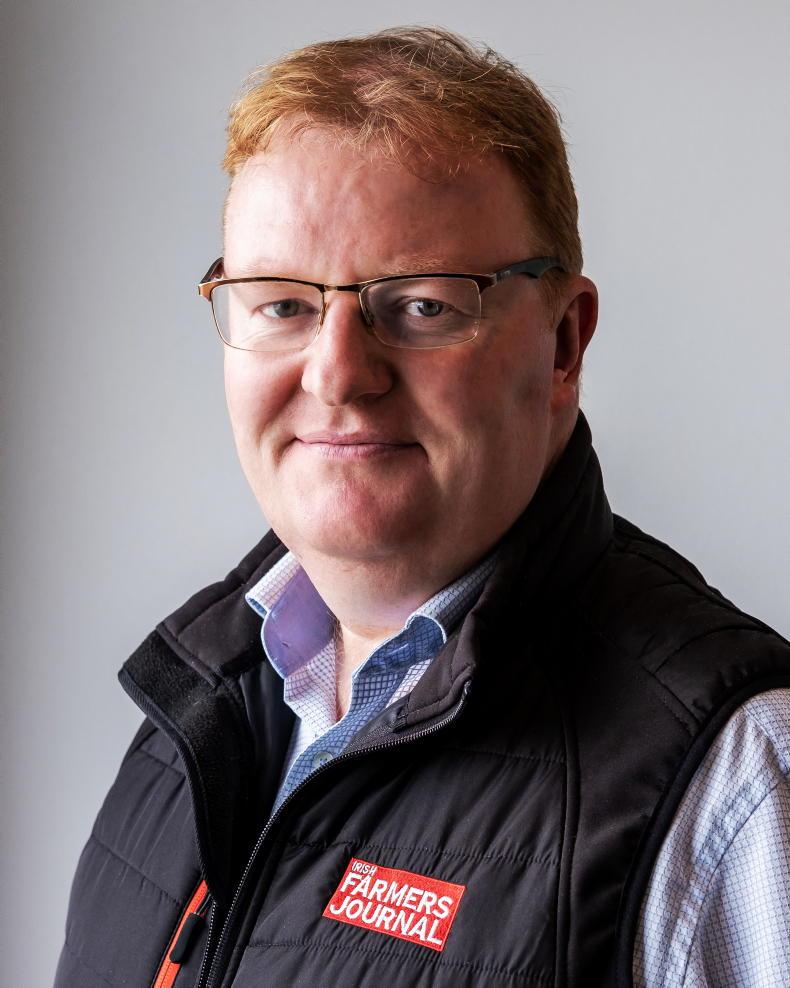
Jack Kennedy.
Jack Kennedy: Is the Brexit Adjustment Reserve fund a one-off or will it be repeated? Brexit impacts and consequences for Irish agriculture won’t be felt until 2024-25, eg the impact of the UK’s free trade deals (FTA) with Australia/New Zealand may flood EU markets with UK beef and sheepmeat
European Commissioner for Agriculture Janusz Wojciechowski: “This is a specific situation of Irish agriculture because Ireland is highly dependent on exports. No other country globally – only maybe New Zealand – is as dependent.
“The most recent milk production data shows there is 1,813kg of milk produced per capita in Ireland and this is six times more than the average EU consumption.
“The same is true in beef/meat where Ireland is eight times over EU average consumption, so it shows Ireland depends a lot on exports. The value of Irish exports to the UK has increased from €5bn to €6bn last year (2022). There is no plan to repeat BAR funding but will monitor the situation and, if necessary, reengage but not now.”
But, Commissioner, would you agree that the FTA impact is only starting now for Ireland?
“I fully understand the concerns about the FTAs and the interests of Irish farmers are important when I consider, for example, our trade agreement with New Zealand.
“Our position was to protect the farmers and not allow huge volumes of imports and the same way when talking to Australia.
“Remember, we have to also understand that the EU is the largest food exporter in the world. For the last decade, that has been the story and in 2022 there was a surplus €58bn and that a huge contribution of this was from Irish farmers and Ireland is the fourth biggest EU member state in this ranking of EU countries.
“Remember, we need the open trade and this makes it profitable for all and we need to be careful not to limit the imports. I mean not fully open but free trade plays a very important role. It depends on what countries you are dealing with but it is generally profitable to have an open market and we need to be careful of restrictions.
“When I look at numbers, there is some positive phenomena in Irish agriculture. The EU data shows us from the last census when we compare 2010 and 2020 that generally we lost 25% of farms in the EU, and in Ireland the comparable figure was only 7%, so the reduction was not as great.”
Is the Commission looking at supports for EU dairy farmers in light of high input costs and falling EU milk prices?
“We fully recognise the problem of low milk prices and this is not unusual as we sometimes have seasonal low prices.
“We will monitor the situation because it is different across the member states but at the next Council meeting (Tuesday 30 May) I will propose to use the crisis reserve fund to make it available for the member states, so that is €250m for this year subject to the approval of the member states.”

'We fully recognise the problem of low milk prices and this is not unusual as we sometimes have seasonal low prices,' the European Commissioner for Agriculture said.
Has the Commission considered the impact of policy on organic production and reduced use of fertiliser in relation to fodder supplies in countries like Ireland? Has there been enough work on the impact assessment of organics in Ireland to roll out an EU policy?
“There is big space for increasing organic production in Ireland. More specifically, Irish farming is not very intensive and in fact is extensive.
“For example, the productivity of one cow is 6,000 litres compared to 10,000 litres per cow in some other countries.
“Extensive production can be profitable and good for the promotion of food and farming and I will take this into account on my promotional campaign to Japan in the next month and when in discussions one of my arguments is that we have extensive production and high welfare standards and Ireland represents that.”
Some have the fear that organic will change the system away from grass and extensive production as you need lower stocking rates so maybe farmers will push for higher per cow production?
“Yes, of course, organic farming is less intensive and the idea is to compensate with additional payment as a subsidy and higher price should be a compensation also and this is complex."
Ireland has one of the best situations and it is very easy to present Irish farming with high welfare standards and our intention is to promote more sustainable farming
“However, we not only need to increase the number of farms but demand for organic consumption also needs to increase and we have a plan and need to develop this and some issues like public procurement and promotion of organic needs to improve.
“So, yes, organic is one thing but the other thing is we need to promote sustainable production and Ireland has one of the best situations and it is very easy to present Irish farming with high welfare standards and our intention is to promote more sustainable farming.”
Will member states have discretion on implementation of the nature restoration law? How will farmers be compensated and for how long?
“OK, so nature restoration is not directly in my brief. My approach was that the Green Deal in agriculture should be included in CAP reform and used to incentivise farmers.
“I feel we achieved good political compromise in the Green Deal and have a lot of actions for the environment in terms of crop diversification, landscape features, many obligations for protecting environment, eg eco schemes mandatory for member states.
“I fully support this to support investment for more climate-friendly initiatives.
“Yes, I hear farmers’ concerns of pesticides and greenhouse gas emissions restrictions, and I share these concerns, when I present to the Commission.
“Now, everything is in the hands of the member states and the main concern of farmers in different countries is that there are different starting points, eg pesticides starting from farmers using 9kg of pesticide to those only using 0.5kg of pesticide per year.
“Proportional reduction is not fair for member states, and this is now controversial, but now this is not a Commission decision and it is up to the member state and the European Parliament.
“Getting back to the nature restoration, I see the agri and fish committees have voted against it.
“In general, in the EU, we must have potential to reduce distance from farm to fork and many member states have access direct to local market and this is preferable.
“However, now we are almost always in permanent crisis – three years of COVID-19, now the war situation, and we need to reconsider this situation.
We need to be independent and have our own production
“We can’t put too much pressure on farmers with new additional expectations in a crisis situation and introducing CAP reform is enough rather than heaping more pressures on farmers.”
Does this mean more emphasis on food security?
“Yes, that was almost forbidden to talk about in the past. However, during COVID-19, this was the first lesson on how important food security is.
“We need to be independent and have our own production.
“Food security is important and is positive and with the intervention of the Commission we avoided food supply issues. This was a helpful lesson from this crisis.
“Now, with the Ukraine situation food security is a main task and vision for future.
“I see a future of four ‘S’ – security, stability, sustainability and solidarity – animals are not machines and solidarity is the role of European farmers in global security and need to maintain this position and it is a key role of the EU.”
How long will it take to go back on the gene-editing rules and allow their use in Europe?
“We discuss gene editing a lot and we need to respect that science but also respect the agriculture and farming to make it more resilient. Two things on this, and this is my position; firstly, we need to protect the farmers that they are not dependent on patent rights.
“Secondly, the situation of organic farmers and co-existence is important because neighbouring farmers might be using GM technology.”

We have the highest production standards in the world and we have WTO rules that we should respect and not create new rules for our exports.
Do you think it is OK to ban gene editing, while we import GM maize and soya beans and import commodities produced using chemicals that are banned here?
“In general, our vision is that it would be better if all the same, but, in practice not always possible but we need to try to achieve as much as possible.
“We have the highest production standards in the world and we have WTO rules that we should respect and not create new rules for our exports.
“We need to be careful, but GMO is not bad in EU, but risk assessment is needed and the role of national legislation is important. In my country, Poland, there is no GMO cultivation but GMO feed is used by farmers.
“I think the general direction is to have the same and we have to promote high standards.”
Shaping the next CAP and changes
You will have significant impact on shaping the next CAP. What are your ambitions and what changes can we expect?
“Almost all farmers in Ireland enter the CAP which I think is great, but I fear some farmers will resign from the CAP and not apply because they think it is too restrictive to apply and I feel we are very close to that situation.
“Some farmers might decide to be free to produce more and have no conditionality and no restrictions."
More sustainable agriculture is what we need and Ireland is a good example because you have good production but also sustainable production
“We need more money in the CAP budget in the next financial year because we create more tasks, more challenges for farmers.
“We also need more instruments for crisis management.
“What was the problem for me was we had CAP policy but not enough common instruments in crisis reserve management.
“Yes, it is better than in the past because we have €450m that is not paid by the farmers. However, it is not enough to solve the problems and we have had to use ‘State aid’ too many times with the most recent example the ongoing war in Ukraine.
“We opened the temporary crisis framework for everyone to include farmers and now that pot is €7.5bn but long-term State aid creates difference between member states so its only a short term measure.”
But come back on the changes expected – will the incentives twist back more to food production than the environment?
“It should be balanced because we need to continue these good proposals that we have going now, good initiatives like the eco schemes.
“If there were two recommendations I would be pushing, it would be carbon farming for cropping farmers and animal welfare as a main instrument for animal farms.
“This is because my observation is that both would be helpful for farmers and helpful for productivity because good agri practices for the long term only come by sustainable agriculture.
It is easy to incentivise and intensify production. However, it’s not what we want. More sustainable agriculture is what we need and Ireland is a good example because you have good production but also sustainable production.”

Jack Kennedy.










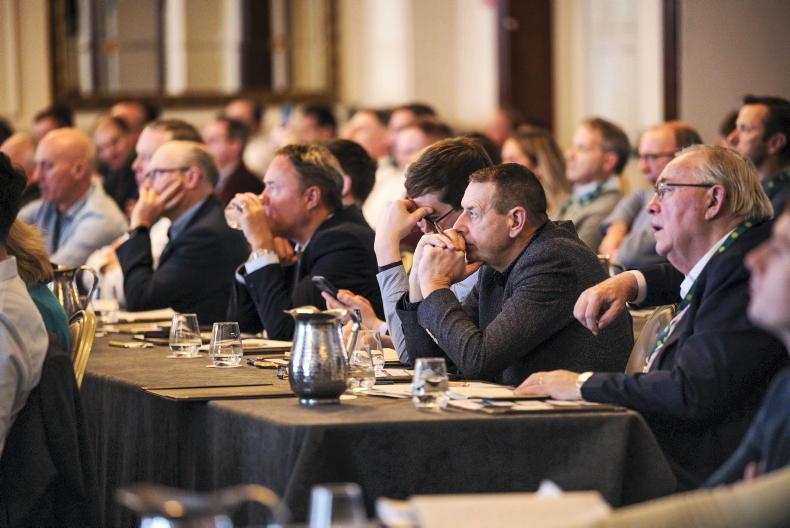
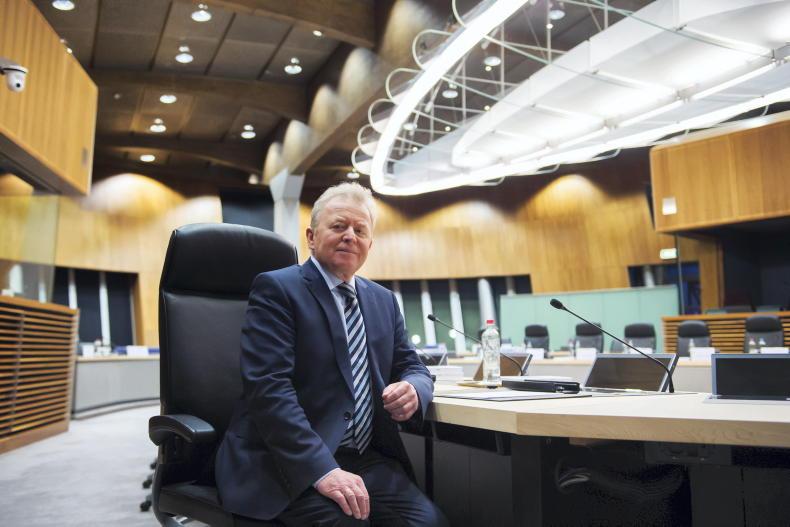

SHARING OPTIONS